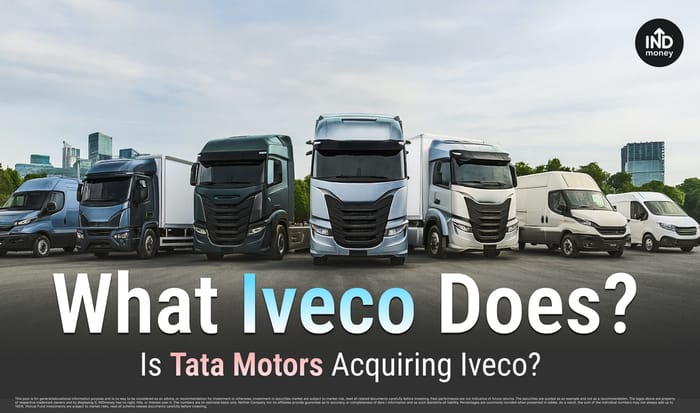
Several reports suggest Tata Motors is in advanced talks to acquire Iveco’s truck business in a potential $4.5 billion deal. This blog looks at what Iveco does, why its truck business matters, how it fits into Tata Motors’ strategy, and what the market reaction has been so far.
What Iveco Does
Iveco Group is a global player in commercial vehicles, powertrain systems, and specialty vehicles. Headquartered in Turin, Italy, the company operates across four key segments: Trucks (Light, Medium, and Heavy), Buses, Defence vehicles, and Powertrain (through FPT Industrial).
It also runs a dedicated financial services business. Iveco is known for its strong position in the European truck and bus markets and has been investing in electrification and joint ventures to support long-term growth.
Is Tata Motors Acquiring Iveco Truck Business?
As of July 30, 2025, no final deal has been officially confirmed. However, multiple media reports from Reuters and Bloomberg indicate that Tata Motors is in advanced discussions to acquire Iveco’s truck business. The estimated deal size is $4.5 billion, which would make it Tata Motors’ largest-ever acquisition.
Iveco has publicly acknowledged that it is exploring potential strategic transactions, including those involving its commercial vehicle and defence businesses. But it has not confirmed Tata Motors as a buyer.
Why Iveco’s Truck Business Matters
Despite current market headwinds, Iveco retains meaningful market share in Europe, especially in the truck segment:
- Light Commercial Vehicles (LCV, 3.5–7.49 tonnes): 12.1% overall market share, 31.2% in chassis cab sub-segment, and 71.8% in upper-end LCVs (6.01–7.49 tonnes).
- Medium & Heavy Trucks (≥7.5 tonnes): 9.1% market share in Europe and 8.0% in heavy trucks (≥16 tonnes).
- These figures show Iveco’s solid foothold in strategic sub-segments, especially LCVs, where demand is growing due to urban logistics and last-mile delivery trends.
Why the Deal May Fit Tata Motors’ Strategy
Tata Motors is India’s leading commercial vehicle manufacturer, with a strong presence across the heavy, medium, light, and passenger carrier segments.
Strategic rationale:
- Geographic diversification: Iveco’s European footprint could complement Tata’s limited exposure in that market.
- Product synergy: Iveco’s electric vans and LCVs align with Tata’s push toward sustainable mobility.
- Technology access: Iveco’s work in electrification and hydrogen trucks fits Tata’s long-term decarbonization roadmap.
Tata’s Current Commercial Vehicle Position
According to Tata Motors’ Investor Day 2025:
- Overall, India's Commercial vehicle CV market share: 37.1%
- Heavy & Medium Goods Vehicles: 48.8%
- Light Goods Vehicles: 30.5%
- Passenger Carriers: 37.6%
- FY25 EBITDA margin (CV business): 11.8%
Tata’s Global Ambitions in CVs
Tata Motors is targeting growth in emerging and underserved global markets.
- The company already exports to SAARC, Sub-Saharan Africa, and the Middle East, and is looking to expand into ASEAN, Latin America, and Central and Eastern Europe.
- Iveco’s presence in Europe could fill that gap and help Tata build a global commercial vehicle portfolio.
Can Tata Motors Afford This Deal?
Yes, current financials suggest that Tata Motors has the balance sheet to consider a $4.5 billion acquisition.
- Free Cash Flow (Consolidated, FY25): ₹22,400 crore
- Credit Ratings, S&P, BBB / Stable. Moody’s, Ba1 / Positive. CRISIL and ICRA, AA+ / Stable
- This gives the company both internal cash generation and external borrowing headroom.
How the Market Reacted
Tata Motors’ stock fell up to 3.7% on July 30, 2025, closing at ₹666.45. Investor concerns are largely centered around:
- Integration challenges across geographies and product lines
- Potential pressure on Tata Motors' margins
- Execution risk in turning around a cyclical business
There’s also a broader concern due to Tata Motors’ reliance on Jaguar Land Rover (JLR). In FY25, JLR made up about:
- 71% of Tata’s consolidated revenue
- Nearly 80% of the operating profit
In July 2025, JLR gave a weaker forecast for FY26:
- Expected EBIT margins: 5–7% (down from 8.5% in FY25)
- Free cash flow: Expected to be close to zero
So while the acquisition is still unconfirmed, its timing amid pressure on JLR’s financial performance has made investors more watchful.
Final Thoughts
The potential acquisition of Iveco’s truck business could significantly boost Tata Motors' global standing in commercial vehicles. With complementary strengths in products, regions, and electrification strategies, the deal makes strategic sense, provided integration is managed carefully.
However, the deal is not yet confirmed, and any final decision will depend on due diligence, regulatory approvals, and strategic alignment on both sides.
Until then, this remains a high-stakes, high-potential story to watch.
Disclaimer
Investments in the securities market are subject to market risks, read all the related documents carefully before investing. The securities are quoted as an example and not as a recommendation.This is nowhere to be considered as an advice, recommendation or solicitation of offer to buy or sell or subscribe for securities. INDStocks SIP / Mini Save is a SIP feature that enables Customer(s) to save a fixed amount on a daily basis to invest in Indian Stock. INDstocks Private Limited (formerly known as INDmoney Private Limited) 616, Level 6, Suncity Success Tower, Sector 65, Gurugram, 122005, SEBI Stock Broking Registration No: INZ000305337, Trading and Clearing Member of NSE (90267, M70042) and BSE, BSE StarMF (6779), SEBI Depository Participant Reg. No. IN-DP-690-2022, Depository Participant ID: CDSL 12095500, Research Analyst Registration No. INH000018948 BSE RA Enlistment No. 6428. Refer https://indstocks.com/pricing?type=indian-stocks; https://www.indstocks.com/page/indian-stocks-sip-terms-and-condition for further details.